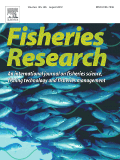
FISHERIES RESEARCH
Scope & Guideline
Unveiling the science behind sustainable fisheries.
Introduction
Aims and Scopes
- Fish Population Dynamics:
Research focused on the dynamics of fish populations, including studies on growth, reproduction, and mortality rates, to inform sustainable management practices. - Ecological Interactions:
Investigating the interactions between fish species and their ecosystems, including predator-prey relationships and the effects of environmental changes on fish behavior and distribution. - Fisheries Management Strategies:
Development and evaluation of management strategies that incorporate ecological, economic, and social factors to enhance the sustainability of fisheries. - Technological Innovations in Fisheries:
Application of advanced technologies, such as machine learning, acoustic monitoring, and genetic tools, to improve fish stock assessments and management practices. - Socio-economic Assessments:
Studies that analyze the socio-economic impacts of fishing activities, including community engagement, market dynamics, and the role of fisheries in local economies. - Conservation and Biodiversity:
Research aimed at understanding and mitigating the impacts of fishing on marine biodiversity, including studies on bycatch reduction and the conservation of threatened species.
Trending and Emerging
- Multi-scale and Integrated Assessments:
There is a growing trend towards multi-scale assessments that integrate biological, ecological, and socio-economic data to provide a comprehensive understanding of fishery systems. - Climate Change Impacts:
Research focusing on the impacts of climate change on fisheries is increasingly prominent, emphasizing the need to understand how shifting environmental conditions affect fish populations and fisheries management. - Use of Artificial Intelligence and Machine Learning:
The application of AI and machine learning techniques for stock assessment, species identification, and monitoring is on the rise, showcasing the potential for improved data analysis and predictive modeling. - Community-Based Fisheries Management:
Emerging studies are highlighting the importance of local knowledge and community engagement in fisheries management, promoting collaborative approaches that involve stakeholders in decision-making. - Genomic and Genetic Techniques:
The use of genomic tools for understanding population structure, connectivity, and resilience is becoming more prevalent, aiding in the management of fish stocks and conservation efforts.
Declining or Waning
- Traditional Stock Assessment Methods:
There has been a noticeable shift away from conventional stock assessment methods towards more integrated and data-rich approaches that consider environmental variables and ecosystem dynamics. - Single Species Management Focus:
Research that concentrates solely on single species management is declining in favor of multispecies and ecosystem-based management frameworks that acknowledge interdependencies among species. - Basic Biological Studies:
While foundational biological studies are still important, there is a decreasing emphasis on basic biological data collection without direct application to management or conservation outcomes. - Static Fisheries Models:
The use of static models that do not account for temporal changes in fish populations and environmental conditions is becoming less common, as dynamic modeling approaches gain prominence.
Similar Journals
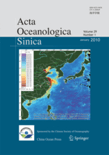
ACTA OCEANOLOGICA SINICA
Fostering Global Collaboration in OceanographyACTA OCEANOLOGICA SINICA, published by SPRINGER, stands as a significant voice in the fields of Aquatic Science and Oceanography, contributing vital research and insights since its inception in 1985. With an ISSN of 0253-505X and an E-ISSN of 1869-1099, this journal maintains a strong international focus, delivering high-quality peer-reviewed articles that address pressing marine and freshwater environmental issues. Although it operates under a subscription model, its Q3 ranking in both Aquatic Science and Oceanography demonstrates its solid standing within Scopus, placing it in the 48th and 44th percentiles respectively. The journal aims to foster knowledge exchange and collaboration among researchers, professionals, and students by providing a platform for innovative studies and comprehensive reviews. With a dedicated editorial board and a commitment to advancing scientific understanding, ACTA OCEANOLOGICA SINICA serves as an essential resource for anyone engaged in the study of oceanographic phenomena and aquatic ecosystems.

REVISTA DE BIOLOGIA MARINA Y OCEANOGRAFIA
Exploring the Depths of Marine KnowledgeREVISTA DE BIOLOGIA MARINA Y OCEANOGRAFIA is a prominent academic journal dedicated to the fields of marine biology and oceanography, published by the Faculty of Marine Sciences and Natural Resources at Universidad de Valparaíso, Chile. Since its inception in 1996, this journal has been a vital platform for disseminating research findings and advancements in aquatic sciences, covering a breadth of topics relevant to the marine environment. With its current impact positioned within the Q4 quartile of both Aquatic Science and Oceanography categories in 2023, the journal serves as an essential resource for scholars, practitioners, and students alike, aiming to enhance their understanding of marine ecosystems. While the journal does not provide open access options, it continues to contribute valuable insights, helping to foster a deeper appreciation for oceanographic science and marine biodiversity. Located in the scenic city of Viña del Mar, Chile, this publication invites manuscripts that push the boundaries of knowledge and stimulate discourse within the marine sciences community, thereby promoting sustainable management and conservation of oceanic resources.

REVIEWS IN FISH BIOLOGY AND FISHERIES
Elevating fisheries science with high-impact insights.Reviews in Fish Biology and Fisheries, published by Springer, is a prestigious journal dedicated to advancing our understanding of fish biology and the principles underpinning fisheries science. With an impact factor reflective of its high citation rate and its recognition as a Q1 category journal in Aquatic Science, it ranks impressively at #9 out of 247 in the Scopus database, placing it within the top 4% of its field. Established in 1991, this journal serves as a crucial platform for researchers, professionals, and students alike, offering comprehensive reviews and insights that foster innovation and collaboration in aquatic research. Although it is not available as an open-access publication, its rigorous peer-review process ensures the dissemination of quality research that informs policy and practices in fisheries management globally. With a diverse range of topics covered, the journal is an essential resource for anyone aiming to deepen their knowledge and impact in the dynamic fields of fish biology and fisheries.

AFRICAN JOURNAL OF MARINE SCIENCE
Innovating solutions for sustainable marine futures.AFRICAN JOURNAL OF MARINE SCIENCE is a premier academic journal dedicated to advancing the field of aquatic sciences and ecological studies, published by Taylor & Francis Ltd. Established in 2003 and based in South Africa, this journal provides a vital platform for researchers, professionals, and students interested in the diverse and dynamic marine ecosystems of Africa. With an impressive impact factor reflected in its Q2 quartile ranking in both Aquatic Science and Ecology, Evolution, Behavior and Systematics categories, the journal showcases innovative research that addresses pressing environmental challenges. Open access options facilitate broad dissemination of knowledge, ensuring that cutting-edge findings are accessible to all stakeholders in the marine research community. As it converges towards its impressive milestone year of 2024, the AFRICAN JOURNAL OF MARINE SCIENCE serves as an essential resource for fostering scientific discourse and collaboration across the continent and beyond.

ACTA ICHTHYOLOGICA ET PISCATORIA
Pioneering open access to aquatic discoveries.ACTA ICHTHYOLOGICA ET PISCATORIA is a distinguished peer-reviewed journal dedicated to the field of ichthyology and fisheries science, published by PENSOFT PUBLISHERS since its establishment as an open-access publication in 1970. Based in Poland, this journal serves as an essential platform for researchers, professionals, and students aiming to contribute to the scientific understanding of aquatic life. With an impressive H-index reflecting its growing influence, ACTA ICHTHYOLOGICA ET PISCATORIA is currently ranked in the Q3 quartile within both the Animal Science and Zoology and Aquatic Science categories. According to Scopus, it holds a rank of #227 in Animal Science and Zoology and #147 in Aquatic Science, demonstrating its relevance and contribution to these fields. The journal’s commitment to open access ensures that research findings are widely disseminated, fostering collaboration and knowledge sharing among the scientific community. With a historical scope extending from 1996 to 2024, ACTA ICHTHYOLOGICA ET PISCATORIA remains a vital resource for advancing aquatic research and fostering new insights into the complexities of fish biology and fisheries management.

FISHERY TECHNOLOGY
Exploring cutting-edge methodologies in fishery technology.FISHERY TECHNOLOGY is a distinguished journal dedicated to the advancement of knowledge in the field of fisheries science and technology. Published by the Society of Fisheries Technologists, India, this journal serves as a vital platform for researchers, professionals, and students across the globe to disseminate innovative findings and methodologies related to fishery practices, aquatic ecosystem management, and sustainable fishing technologies. With its ISSN 0015-3001, FISHERY TECHNOLOGY seeks to uphold the standards of scholarly research and contributes significantly to the discourse surrounding marine resources and their sustainable utilization. Although currently not available in an open-access format, the journal remains committed to reaching a wide audience through reputable distribution channels. The journal is characterized by its goal to bridge theoretical research with practical applications, thereby impacting both the scientific community and the fishing industry. Engage with FISHERY TECHNOLOGY to keep abreast of the latest developments and contribute to the sustainable management of aquatic resources.
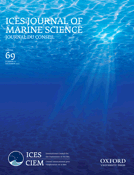
ICES JOURNAL OF MARINE SCIENCE
Delivering Cutting-Edge Insights into Our OceansThe ICES Journal of Marine Science, published by Oxford University Press, stands at the forefront of marine research, offering cutting-edge insights into aquatic sciences and oceanography since its inception in 1903. With its ISSN 1054-3139 and E-ISSN 1095-9289, this esteemed journal has garnered a reputation for excellence, evidenced by its Q1 rankings in categories such as Aquatic Science, Ecology, and Oceanography as of 2023. The journal's commitment to advancing knowledge in marine systems makes it an essential resource for researchers, professionals, and students alike, who are keen to explore the intricate ecosystems that sustain our planet. Without an open access model, the journal maintains a rigorous editorial standard and is recognized among the top journals, ranking impressively in various Scopus categories. Authored contributions reflect pioneering research that informs policy and fosters sustainable practices, making this journal a critical platform for disseminating marine science knowledge.
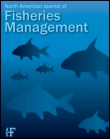
NORTH AMERICAN JOURNAL OF FISHERIES MANAGEMENT
Empowering Research for Responsible Fisheries PracticesNORTH AMERICAN JOURNAL OF FISHERIES MANAGEMENT, published by WILEY, is a premier peer-reviewed journal dedicated to advancing the science and management of freshwater and marine fisheries across North America. With an ISSN of 0275-5947 and E-ISSN of 1548-8675, this esteemed journal has been a crucial platform for innovative research from its inception in 1981 through to its anticipated evolution in 2024. The journal is recognized for its rigorous scholarship, evidenced by its impact in various categories with a Q2 ranking in Aquatic Science, Ecology, and Ecology, Evolution, Behavior and Systematics, as well as a Q3 ranking in the domain of Management, Monitoring, Policy and Law. Researchers and practitioners can access cutting-edge findings that address critical environmental challenges and promote sustainable fisheries management. With a consistent focus on ecological implications and policy development, this journal serves as an essential resource for those aiming to make a significant impact in fisheries science and management.
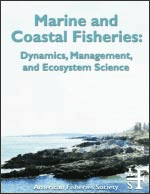
Marine and Coastal Fisheries
Exploring the depths of fisheries science and conservation.Marine and Coastal Fisheries, published by Wiley, is a leading open access journal that has been dedicated to advancing the field of fisheries science since its inception in 2009. With an esteemed Q1 ranking in Aquatic Science and a Q2 ranking in Ecology, Evolution, Behavior and Systematics as of 2023, the journal actively contributes to the understanding and management of marine and coastal ecosystems.
This journal serves a diverse audience ranging from researchers and practitioners to students, providing a platform for high-quality peer-reviewed articles that address contemporary challenges in fisheries management and conservation. With a commitment to global accessibility, Marine and Coastal Fisheries promotes the dissemination of scientific knowledge to enhance sustainable practices in marine environments, making it an essential resource for those invested in the health of aquatic ecosystems. To explore the latest research and insights, visit the journal's website and engage with the thriving community of marine science professionals.
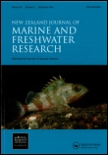
NEW ZEALAND JOURNAL OF MARINE AND FRESHWATER RESEARCH
Advancing Knowledge in Freshwater and Marine EcosystemsNEW ZEALAND JOURNAL OF MARINE AND FRESHWATER RESEARCH, published by Taylor & Francis Ltd, stands as a distinguished platform for the dissemination of innovative research in the realms of aquatic science and ecology. With an ISSN of 0028-8330 and E-ISSN 1175-8805, this journal has been curating significant scientific contributions since its inception in 1967, continuing through to 2024. Recognized in the Q2 category across multiple relevant fields—including Aquatic Science, Ecology, and Water Science—this journal ranks notably in Scopus, with a 74th percentile for Ecology, Evolution, Behavior and Systematics, highlighting its impact and relevance within the scientific community. Though not an open-access publication, its rigorous peer-reviewed articles offer insights that resonate with researchers, professionals, and students who are passionate about advancing our understanding of freshwater and marine ecosystems. By fostering a collaborative space for ecological and environmental inquiries, the NEW ZEALAND JOURNAL OF MARINE AND FRESHWATER RESEARCH is essential for those aiming to contribute to the vital conversations around biodiversity, conservation, and sustainable management of aquatic resources.